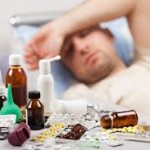 Men are at a distinct disadvantage when it comes to rehabilitation after stroke. This has been because during formation in the womb the initial bursts of testosterone will sever many of the connections between the left and right hemispheres of the brain. During normal function this has no effect on the cognitive function or processing of information. However, following a stroke this lack of communication between the hemispheres makes compensation difficult, if not impossible.
Men are at a distinct disadvantage when it comes to rehabilitation after stroke. This has been because during formation in the womb the initial bursts of testosterone will sever many of the connections between the left and right hemispheres of the brain. During normal function this has no effect on the cognitive function or processing of information. However, following a stroke this lack of communication between the hemispheres makes compensation difficult, if not impossible.
In a research study released in December 2004, researchers found that those who suffered from a traumatic brain injury may be able to reprogram the brain to improve motor skills and control artificial limbs. Using MRI imaging to record brain changes during motor activities, they demonstrated that individuals are able to learn to remap or redirect motor commands when cognitive function isn’t impaired. (1)
Using a glove that is attached to a computer and functional MRI imaging, ‘normal’ subjects were asked to perform motor commands. During the procedure, researchers were able to visualize the part of the brain that functions when intricate motion is required. This knowledge will allow physicians to have a better understanding of how to help those patients who have had strokes or traumatic injury to regain motor control through the use of electrodes and remapping.
Researchers also understand that depression and cognitive impairment will affect the physical outcome of stroke rehabilitation. Currently there is limited data on depressive symptoms and improvements influenced by functional status and recovery. Unfortunately, men appear to suffer from more depression following stroke than do women which would negatively affect the outcome of rehabilitation.
 In a six-month study of 141 stroke patients, researchers found the data suggested improving depression in stroke patients accelerates functional recovery but the level of physical functioning achieved will ultimately be determined by neurological and cognitive factors. This is consistent with the evidence that improvement of depression is limited by cognitive impairment. (2)
In a six-month study of 141 stroke patients, researchers found the data suggested improving depression in stroke patients accelerates functional recovery but the level of physical functioning achieved will ultimately be determined by neurological and cognitive factors. This is consistent with the evidence that improvement of depression is limited by cognitive impairment. (2)
In another study published in the Oxford University Press Journal, researchers reported that when stroke patients in Finland listened to music for several hours every day their verbal memory and attention span improved significantly compared to those patients who either heard no music or who listened only to stories being read aloud. These findings support growing research which points to the benefits of music therapy for many conditions including autism, schizophrenia and dementia. However this was the first time it was found to have a positive effect on those victims of traumatic brain injury or stroke. (3)
During this study, researchers worked with patients as soon as possible after having been admitted to the hospital. The 54 patients who completed a study went through a battery of cognitive and psychological tests that showed a vast improvement in their cognitive function. Three months after their stroke their verbal memory still boosted 60% over that of the patients who did not receive music therapy. This improvement in cognitive function will theoretically decrease the patient’s risks of depression. This decreased risk of depression will ultimately affect the physical function achieved by the patient.
In another study published by researchers in St. Louis, scientists appeared to find that the addition of testosterone to the patient speeds up the recovery from stroke. These results were based on two groups of rats that had suffered stroke. Both groups were castrated and half received testosterone and half a placebo following stroke. Further research continues to be needed in order to fully understand the use of testosterone in either men or women following a stroke.
More research continues to be requested in in order to evaluate the differences in recovery between men and women from a stroke. By finding these differences the potential exists that researchers and scientists will be able to improve rehabilitation and function following the stroke of both men and women.
References:
(1) National Institute of Neurological Disorders and Stroke: Traumatic Brain Injury
http://www.ninds.nih.gov/disorders/tbi/detail_tbi.htm
(2) Acta Neurologica Scandinavica: Is Improvment in Impaired Cognition and Depressive Symptoms in Post-Stroke Patients Associated with Recoveries in Activities of Daily Living
http://www.ncbi.nlm.nih.gov/pubmed/17489945
(3) University of Helsinki: Listening to Music Improves Stroke Patients’ Recovery
http://www.ncbi.nlm.nih.gov/pubmed/17489945
Resources:
National Stroke Association: Recovery
http://www.stroke.org/site/PageServer?pagename=recov
Stroke Center: Recovering After a Stroke
http://www.strokecenter.org/wp-content/uploads/2011/08/Recovering-After-a-Stroke.pdf
News-Medical: Testosterone May Help Men Recover from a Stroke
http://www.news-medical.net/news/2004/10/05/5337.aspx
Stroke Education
http://www.stroke-education.com/stroke.php
Stroke: Sex Differences In Stroke Recovery and Stroke Specific Quality of Life
http://stroke.ahajournals.org/content/38/9/2541.full
MayoClinic: Stroke
http://www.mayoclinic.com/health/stroke-rehabilitation/BN00057
Preventing Chronic Disease: Sex Differences in Stroke Recovery
http://www.ncbi.nlm.nih.gov/pmc/articles/PMC1364522/


Leave a Reply